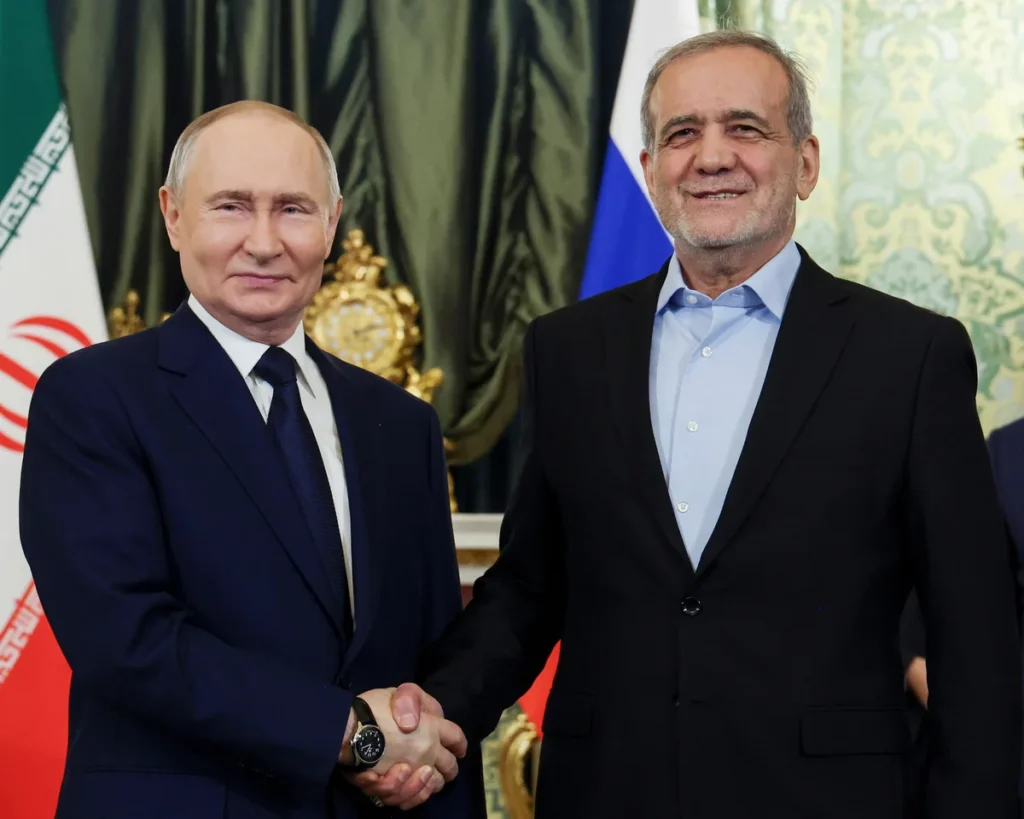While some in Moscow have tried to put positive spin on Israel’s assault, Kremlin risks losing key strategic partnerWed 18 Jun 2025 17.52
When a group of Russian and Iranian foreign policy officials arranged to meet in Moscow for a conference titled “Russian-Iranian cooperation in a changing world”, they probably did not anticipate just how timely that phrase would turn out to be.
Seated around a table on Wednesday at the President hotel near the Kremlin, officials from both sides were forced to confront a stark new reality: Iran’s regime – a key ally of Moscow – is facing its most serious threat in decades.
As Israel and Donald Trump demand Tehran’s “unconditional surrender”, Moscow is growing increasingly anxious about the fate of Iran, while tacitly acknowledging its limited ability to influence the unfolding events.
Nikita Smagin, an independent expert on Russia-Iran ties, said: “It has long been clear that Russia wouldn’t defend Iran militarily, because it is simply not prepared to risk a confrontation with Israel and the United States for Iran’s sake.”
Analysts say Moscow’s cautious response reflects a cold political calculus: prioritising its war in Ukraine while simultaneously trying to dissuade the US from direct involvement in a conflict that could lead to regime change in Tehran.
The Kremlin is unlikely to arm Iran, let alone get involved in the fighting, said a Russian source with ties to the foreign ministry. “Moscow clearly doesn’t want conflict with Trump and is also doing everything it can to urge the US to return to diplomacy. But Russia’s priority remains avoiding any moves that could undermine its warming ties with the new US administration or prompt a shift in Trump’s stance on Ukraine,” the source said.
Still, the Kremlin stands to lose from a prolonged US-backed Israeli military campaign that devastates Iran’s economic and military infrastructure and threatens the survival of the regime in Tehran.
“If the current Iranian regime collapses, it would be both a strategic and reputational blow for Russia,” the source with ties to the Russian foreign ministry said.
“A bigger loss than the fall of Damascus,” the source added, referring to Moscow’s diminished influence over Syria after the fall of Bashar al-Assad, a longtime Kremlin ally whose eventual defeat marked the end of a costly decade-long Russian intervention.
On the surface, Russia’s muted response and restrained condemnations stand in contrast to the deepening ties it has forged with Iran since its 2022 invasion of Ukraine
In the early months of Russia’s invasion of Ukraine, Iran proved to be an important partner to the Kremlin, supplying Moscow with thousands of combat drones used to strike Ukrainian cities. Tehran also later sent instructors to Russia to help set up a drone production facility, based on Iranian designs, deep in the Ural mountains.
Vladimir Putin in turn praised the deepening ties between the two countries. In January he and his Iranian counterpart, Masoud Pezeshkian, signed a wide-ranging “comprehensive strategic partnership treaty” aimed at strengthening military cooperation and intelligence sharing.
Still, the two nations’ relationship has always been complex, observers say. When signing the military agreement, both countries insisted on omitting a mutual defence clause, meaning Moscow now is under no legal obligation to provide military assistance to Iran. Russia has also been slow to deliver a range of weapons Tehran has requested.
“Despite repeated requests from the Iranian side for various types of weapons – air defence systems and fighter jets – none of this has been transferred to Iran by Russia to date,” Smagin said.


